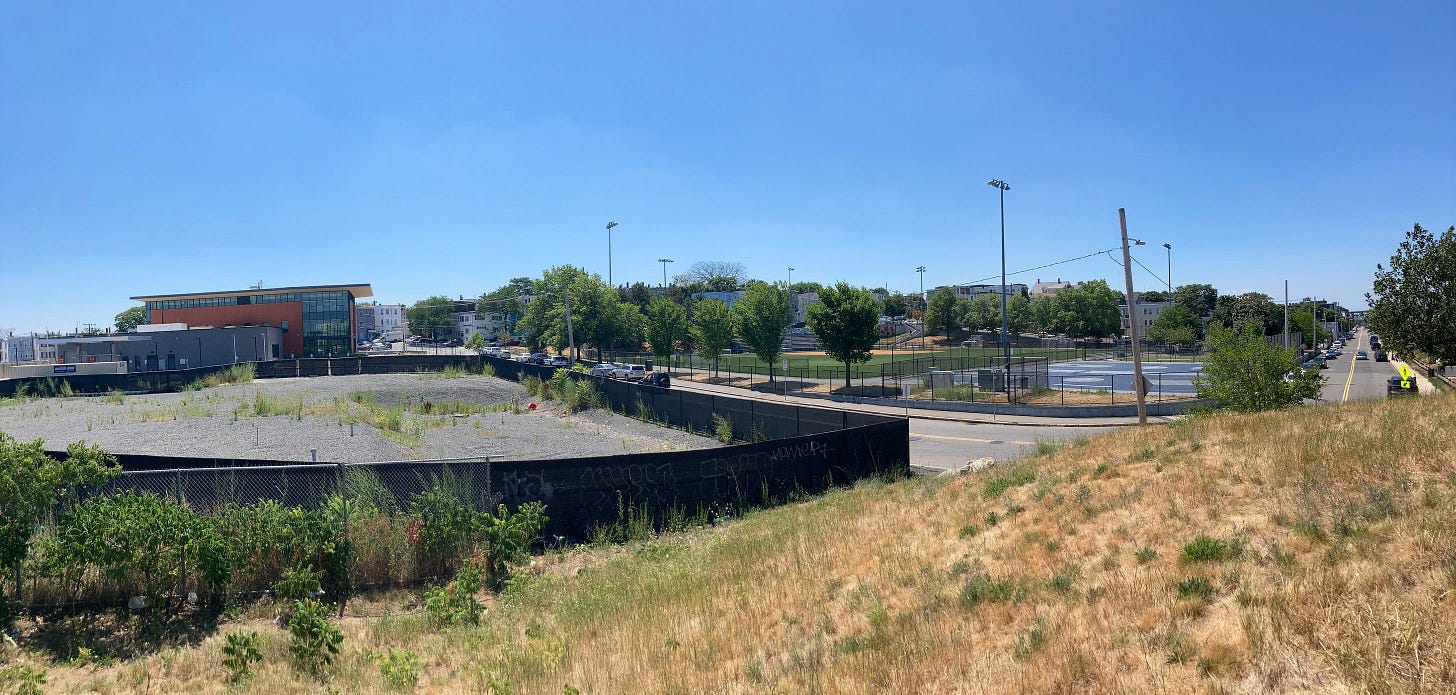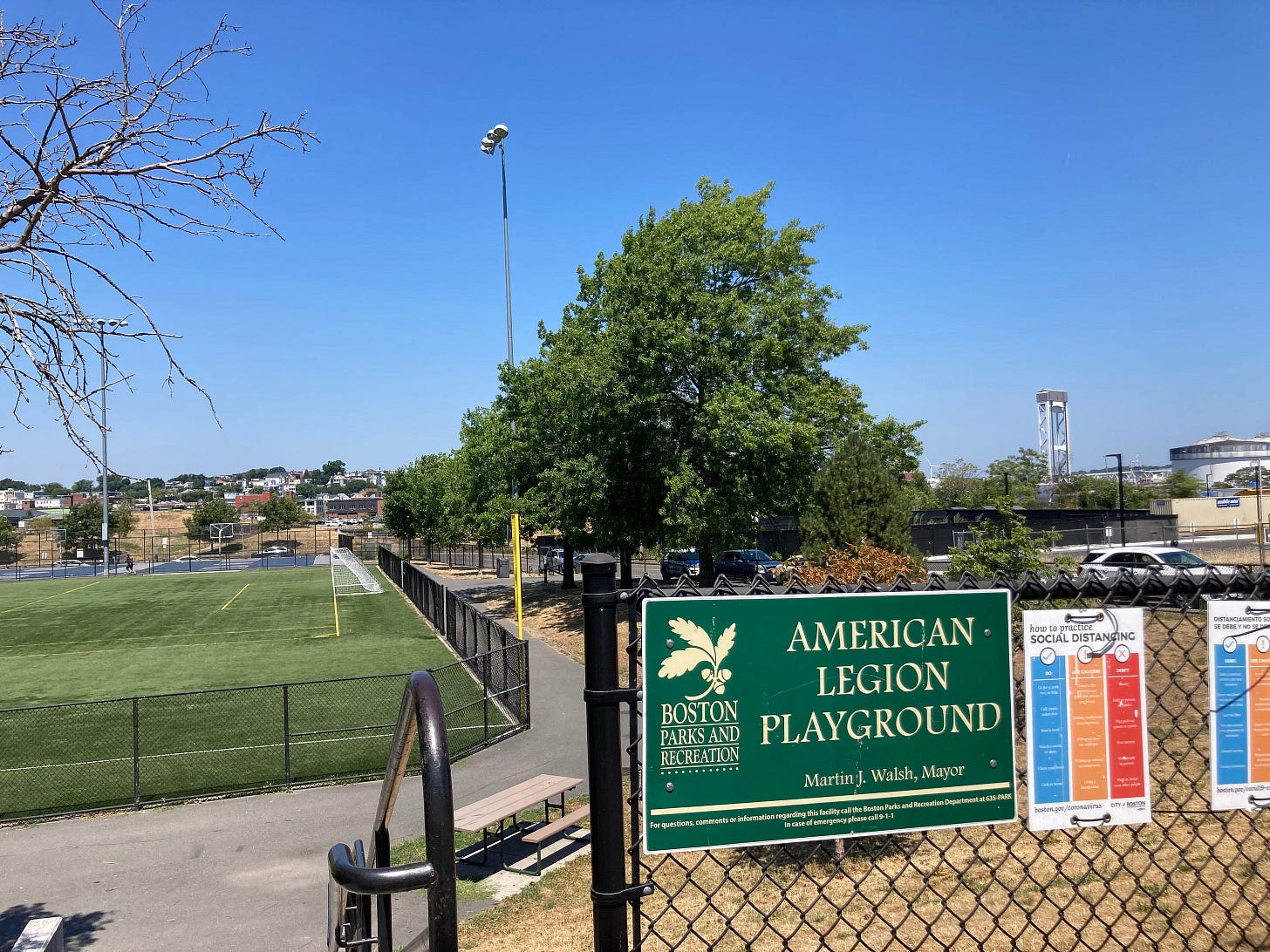Environmental justice updates: 'If we can’t stop it, then we can make sure it's the last one'
Checking in on the environmental justice fights in Peabody and East Boston
The ongoing fights over the Peabody peaker plant and Eversource’s proposed substation in East Boston share several similarities. Both involve large utility projects facing fierce opposition from local organizers due to threats to vulnerable communities, non-transparent and undemocratic approval processes, and a reluctance to consider renewable energy alternatives.
The opposition to the substation in East Boston has been ongoing since 2014, while residents have been organizing against the Peabody peaker since they found out about the project in spring of 2021. While there hasn’t been major news about either of the projects this summer, both seem to be nearing critical junctions, with implications on the state’s transition to clean energy. So where do these fights stand today?
East Boston
The proposed site of Eversource’s East Boston substation, flanked by a park and playground on the right.
84% of Boston voters opposed the construction of Eversource’s proposed electrical substation in East Boston last November. However, this vote was in a nonbinding referendum, and Eversource has pushed ahead with its plans to construct the substation on a flood-prone plot in a residential neighborhood, across the street from a park, and on the property adjacent to a jet fuel storage facility for Logan Airport.
Just this Monday, a transformer exploded at an Eversource substation in Lexington, igniting a three-alarm fire at the facility.
Currently, the fate of the substation in East Boston depends upon a pending legal challenge to the state’s Energy Facilities Siting Board (EFSB — members are appointed by the governor), which has previously ruled in Eversource’s favor on the project.
GreenRoots, a Chelsea-based environmental justice organization, along with some East Boston residents, are challenging Eversource’s ability to override part of the Boston permitting process. GreenRoots is also appealing EFSB’s approval a location change for the project.
John Walkey, GreenRoots’ Director of Waterfront and Climate Justice Initiatives, spoke with me about their opposition to the substation.
“It’s been a huge learning process, looking under the hood, or more aptly actually seeing what gross animal parts go into sausage making,” Walkey said. “Because we’re really getting a good feel for the regulatory system that manages this whole thing — it’s just a complete shit show in terms of the revolving door between the regulated industry and the regulators, it spins pretty fast and loose. Actually, there’s not actually a revolving door, it's just an open office concept between the private sector and the regulators.”
“Nothing is intelligible to the public,” Walkey added. “None of this stuff is advertised or put out there in a way that is accessible to people, whether we're talking about putting it into languages that the impacted community speaks … but then also just putting it from the technical and legal English to just plain English so people can understand what’s happening.”
While much of the data that Eversource is using to justify the project isn’t actually available to the public, Walkey said that based on the data he has seen, he thinks that the need for this substation has more to do with the expansion of Logan Airport than any current or future community needs.
He also added that while Eversource likes to point to their remediation efforts in the community, all of these projects are ultimately funded by ratepayers. These efforts are included in the overall cost of the project, off of which Eversource will make a guaranteed fixed percentage of profit, Walkey said.
“The more mitigation they stuff into this project, the more they do things they can make public relations hay out of, the more money they’re actually gonna provide to their shareholders,” said Walkey.
Boston State Senator Lydia Edwards also testified in opposition to the construction of the project to the EFSB. I spoke with Edwards earlier this year in March about a home rule petition that she passed through the Boston City Council that would allow the city’s Building Commissioner to halt projects that pose environmental threats to residents (along with adding environmental justice considerations to the city zoning laws).
The home rule petition does not yet appear to have been signed by Mayor Michelle Wu (the mayor’s office has yet to get back to me on this), though she has been a vocal opponent of the substation.
“That’s still in play,” Edwards told me recently.
If Mayor Wu signs the petition, it will then be sent on to the state legislature. Edwards expects the state’s utility companies to oppose any legislation limiting their ability to push through projects like the East Boston substation.
“Right now, they have a culture where they define what the need is, they define the price for it, and they control how they give it to you,” Edwards said. “They have a complete monopoly on this, so nothing that takes away that power is something they’re going to support. That’s why they’re against it.”
Peabody
In contrast to the East Boston substation, construction on the Peabody peaker is “well underway,” in the words of a spokesperson for the Massachusetts Municipal Wholesale Electric Company (MMWEC). The plant is scheduled to open in June of 2023.
For the local opposition to the project, this summer has been a period of reflection.
“We’re kind of taking a breather, watching what’s going on, and figuring out where we can make the most impact,” said Susan Smoller, one of the founders of Breathe Clean North Shore (BCNS), a community group based in Peabody that sprung up in opposition to the peaker. “We have evolved into a ‘stop burning stuff in Peabody’ campaign, that would include not only the new peaker, but the city’s two existing peakers.”
Smoller said that she is hopeful that a new administration in the governor’s office will revisit the justifications for this project.
“I have to have hope that when people take a look at it, they’ll see that it’s absurd to be investing in brand-new fossil fuel infrastructure in 2022,” Smoller said. “It goes against everything that’s in the climate bill. And if we can’t stop it, then we can make sure it’s the last one — the last brand new one that is built in the state.”
Several climate justice organizations throughout the state have also joined the fight against the plant, including 350Mass and Massachusetts Climate Action Network (MCAN).
“It is so hard to know why people hold on to it,” said Judith Black, a member of 350Mass’s North Shore node. “We have rallied, we have protested, we have written letters, we have gotten our local politicians to speak out. Nothing moves the dial.”
This spring, Black took part in a hunger strike to call attention to the construction of the peaker — “I never even make it through Yom Kippur without eating. But this felt important enough.”
As far as next steps, “all we can do is up the ante,” Black said. “We have a group of people who are thinking about that, and we’re planning actions for the beginning of September and October which will be … I can say … more assertive.”
“I don’t know if we can stop them, but we can still give them grief, we can still bring it into high profile, and it shouldn’t go up,” she added.
Logan Malik, the Clean Energy Director at MCAN, expressed his disappointment with the state’s response to the concerns of residents.
“We’ve been really frustrated. We haven’t gotten any response from the secretary of energy and environmental affairs. We were hoping that the new secretary, Beth Card, would listen to residents, would at least hear out the residents. That’s what we’re really asking for at this point.”
MCAN is now working to better understand how the new peaker would affect the health of residents in the surrounding communities, compounded with the effects of Peabody’s two existing oil and gas plants.
“This is something that we’ve asked for time and time again from the Secretary of EEA, from MMWEC, from the state writ-large,” Malik said. “The residents deserve to know what impact this project is going to have on their well-being, and thus far they have not been willing to answer those questions.”
“At the end of the day, we have to remember that these communities choose to be served by MMWEC and they can choose not to be served by MMWEC,” Malik added. “I think this saga has really indicated that MMWEC has way too much control and not even close to enough oversight by state entities.”
Climate News Roundup
Connecticut
Connecticut’s aging stormwater infrastructure, increasingly burdened by climate change-driven extreme weather, will receive $580 million in state and federal funding for upgrades (Susan Dunne — Hartford Courant).
Climate change is driving an increase and expansion of tick populations, bringing greater risks of Lyme disease (Amy Coval — Samford Advocate).
Maine
Profits boomed for the parent companies for Maine’s largest private utilities as they hiked costs for ratepayers. These companies have recently announced a new round of rate increases (Dan Neumann — Maine Beacon).
Drought conditions are threating farmers’ ability to irrigate (Jack Molmud — News Center Maine).
Massachusetts
The deadline for Gov. Charlie Baker to sign the legislature’s broad climate bill is TODAY at midnight. No word yet. In the meantime, call his office to give your input on the bill if you start to feel too antsy (617-725-4005).
Increased periods to extreme heat are stressing the distribution system of the state’s grid, leading to power outages (Sabrina Shankman — Boston Globe).
Massachusetts’ new environmental justice advisory council convened for the first time a couple weeks ago. Among the nine members appointed was a representative from National Grid (Dharna Noor — The Boston Globe).
Candidates for Massachusetts Attorney General outlined their views on climate and transit in a recent debate (Stephanie Ebbert — The Boston Globe).
New Hampshire
Following utility rate hikes, climate activists met outside the State House to urge the state to divest from fossil fuels and increase investments in renewable energy (NHPR — Laura Bratton).
Most of the state has been facing moderate drought conditions, with wide effects across the state (NHPR — Mara Hoplamazian).
Rhode Island
Candidates for governor faced off in a debate about environmental issues (Brian Amaral — Boston Globe).
Pawtucket is planning to sell the only public green space for two environmental justice neighborhoods to a private real estate company, which would turn the park into a parking lot (Frank Carini — ecoRI).
Vermont
Becca Balint cruised to victory in the Democratic primary for Vermont’s sole seat in the US House, running on a progressive Green New Deal platform. Read about her climate platform here: (Emma Cotton and Kori Skillman — VTDigger).
Vermont will recieve 37 million in federal funding over the next five years to bolster transportation infrastructure against increasing extreme weather (Emma Cotton — VTDigger).
Region-Wide
The National Oceanic and Atmospheric Administration released its annual high tide flooding outlook, including projections for 2050 (NOAA).





